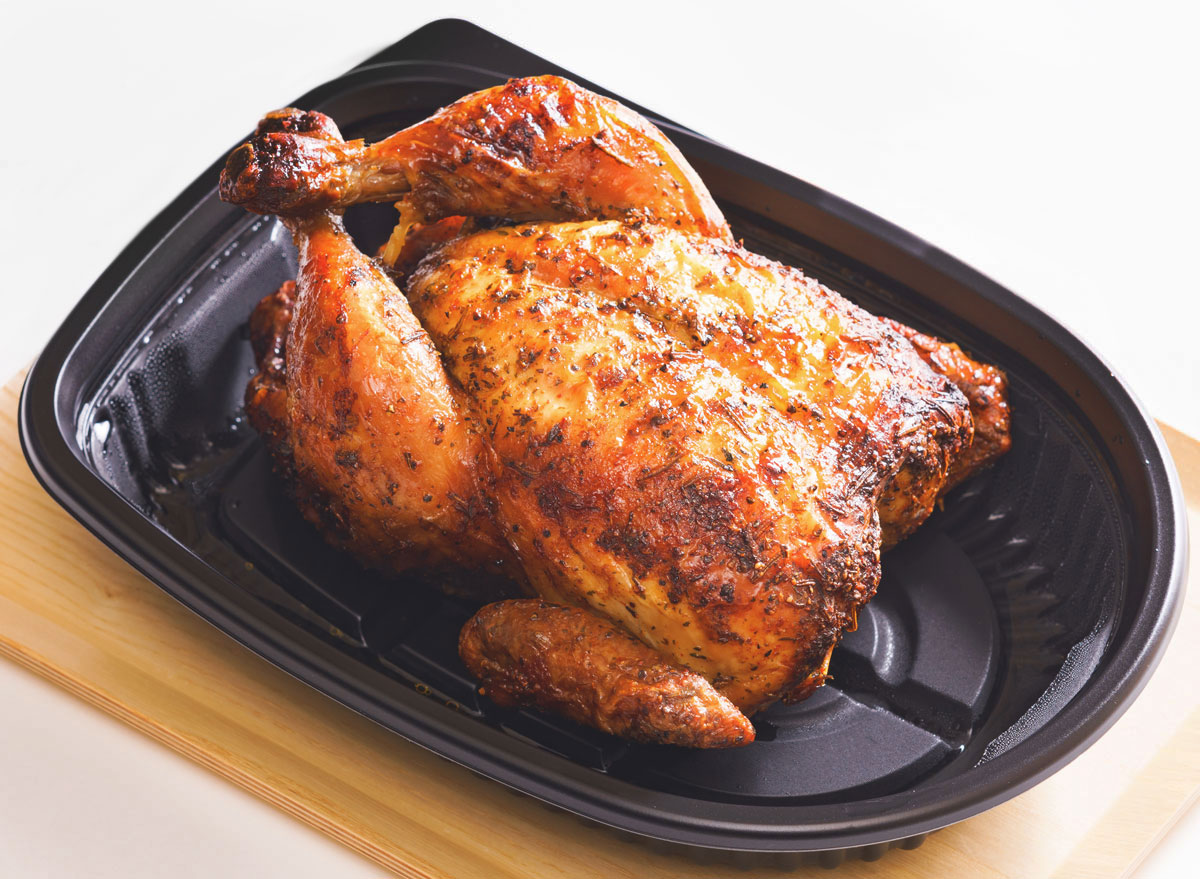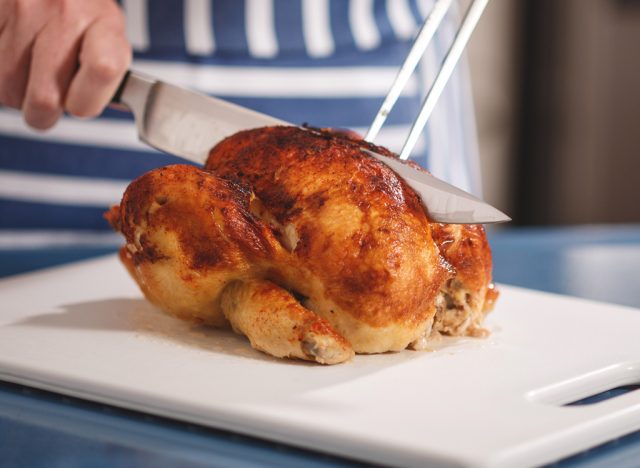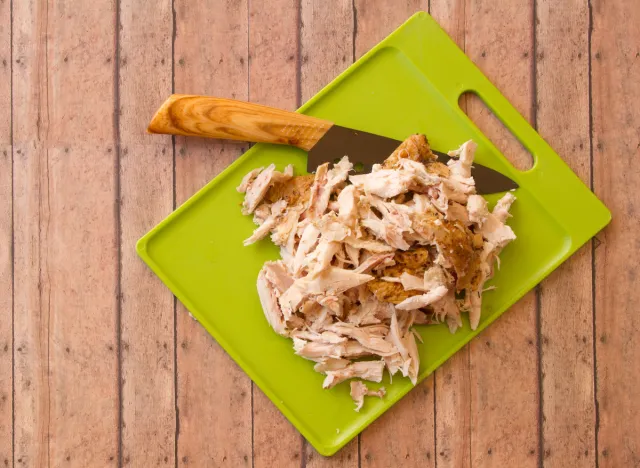How Long Is Rotisserie Chicken Good For? We Asked the Experts

There's no denying that the convenience and versatility of a fully-cooked rotisserie chicken enhance its appeal as an economical purchase—but how long is rotisserie chicken good for after you take it home? While some might assume that these ready-made birds have a significantly long shelf-life, the truth is rotisserie chicken, unfortunately, doesn't last forever. If not stored properly or eaten within the recommended window of freshness, a rotisserie chicken can spoil just as easily as any other meat product.
To find just how long a rotisserie chicken is good for—plus give you storage tips to help you get the best out of your bird—we consulted a handful of registered dietitian nutritionists and culinary experts. Read on to learn just how long rotisserie chicken is good for, and for more tips to help you better preserve your poultry, check out How Long Raw Chicken Lasts in the Fridge—and Signs It's Gone Bad.
How long is rotisserie chicken good for?
According to the USDA, a fully cooked, ready-made rotisserie chicken will generally last about three to four days. It's also advised that you either eat or refrigerate your newly purchased rotisserie chicken within two hours of picking it up from the store to retain peak freshness.
Tips to keep your rotisserie chicken fresher for longer

- Carve the chicken before storing it: "Carve the chicken ASAP to get it out of that pooled chicken juice at the bottom of the container," suggests Chef Jasmine Mattey, chef and culinary expert at Kitchen Ambition. "You can store the carcass separately in the fridge or freezer and save it for when you're making a big batch of stock."
- Refrigerate it within 2 hours: "Try to get the chicken into the fridge as soon as possible—within two hours of buying it at the store if you can—to prevent bacterial growth that'll cause the chicken to spoil faster," warns Chef Mattey. "When it comes to food safety, you want to keep two Ts in mind—time and temperature," says Hailey Gorski, RD, a registered dietitian nutritionist and founder of The Tipsy Kale. "If food is outside of the optimal time and temperature, it is at risk of growing a dangerous level of bacteria. The temperature 'danger zone' where bacteria grows most rapidly is 40°F–140°F; keep hot food at or above 140°F and cold food at or below 40°F," adds Gorski. "Minimize the time your food is within that temperature range to reduce risk." Gorski suggests that you take what she refers to as the "shred and chill" approach. "If you choose to store the chicken in the fridge, shred the chicken within one to two hours and store [it] in an airtight container," explains Gorski. "Shredding the chicken will allow it to chill quicker and reduce the time in the 'danger zone.'"
- Store it in a different container than what it came in: "To maintain freshness and safety, transfer the chicken into a well-sealed bag or food storage container if you aren't going to eat it within one to two days," advises Rosanne Rust, MS, RDN, member of the Academy of Nutrition and Dietetics, and author of Zero Waste Cooking For Dummies®. Even if you're planning to eat the chicken when you get home, if there are any parts of the bird that you haven't finished, "it's also important to make sure that any leftovers are consumed within two hours after cooking," adds Rebecca Novak, RD, a New York-based registered dietitian and chef at Hungarian Chef.
Can you freeze rotisserie chicken?

Although rotisserie chicken may only last three to four days in the fridge, don't feel pressured to polish off the whole bird in that time frame! Rather than panic eat your poultry, there are ways to prep and store your rotisserie chicken for a later date when you're ready to eat it.
To store your rotisserie chicken for a later date, Chef Mattey suggests that you "wrap the carved chicken meat tightly in plastic wrap. Then, transfer that to a resealable freezer bag and store it in the freezer. That way, it'll keep for four months."
Rust also offers resourceful recommendations to help store your leftovers that will not only help elongate its shelf-life but also enables less waste and easier meal prep. "I'd recommend removing all of the meat from the bones and then placing it into a zippered freezer bag," suggests Rust. "You might consider packaging it into three to four smaller bags if your household is small. That way, you can just take out two servings at a time."
"Alternatively, you could cut the breast meat off, place that in a freezer bag, and place the legs, thighs, and wings into separate bags. Then, place the remaining carcass into a large pot, cover [it] with water, and make broth!" adds Rust.
Whether you store your bird in the fridge or freezer, Gorski underscores the importance of noting the storage date somewhere clear and easily accessible. "Write the date on the container, so you can keep track of how long it's been in the fridge or freezer."
"Be sure to push all of the air out of the bag before sealing, labeling, dating, and freezing," says Rust.
RELATED: This Is How Long You Can Store Chicken in the Freezer
How to reheat frozen rotisserie chicken
Though a rotisserie chicken can last up to four months in the freezer, Gorski notes that though this can be a useful means to help it last, "it may come at the sacrifice for texture and moisture." That said, you'll want to be strategic about how you go about reheating a frozen rotisserie chicken.
"To reheat it, thaw it overnight in the refrigerator and then place it in an oven-safe dish and bake at 350°F until the internal temperature reaches 165 °F," advises Novak. "Alternatively, you can microwave frozen rotisserie chicken on high power for two to three minutes per side until hot and steaming."
Another way to reheat a chicken you've kept frozen, according to Chef Mattey, is to break out the air fryer. "The best way to reheat frozen rotisserie chicken is to let it thaw in the fridge and then pop it in the air fryer!" she says. "I like to season mine with whatever herbs I have on hand, onion powder, and garlic powder. Reheat it in an air fryer or toaster oven until it reaches 165°F and dig in!"
Gorski's suggested best practices for reheating rotisserie chicken emphasize food safety. "The safest way to thaw a rotisserie chicken is in the fridge," she says. "Allow 24 hours for the chicken to thaw before eating."
Additionally, Gorski shares two tried-and-true methods for reheating a rotisserie chicken, which can be especially effective when short on time:
- When reheating after taking it out of the fridge, use the microwave: "If you're planning to eat the chicken immediately, you can also microwave it," she explains. "Cold spots can occur and put you at risk for foodborne illness because the microwave does not cook evenly—so always cook the chicken immediately after."
- When pulling it from the freezer, take the "cold water thaw" approach: "A quicker method [for reheating frozen rotisserie chicken] is thawing in cold water—but it will require monitoring," says Gorski. "A big mistake people make when thawing food is they put it under hot water. Perishable food should never be left in hot water. Rather, thaw the chicken in a bowl of cold water and change the water every 30 minutes. One pound of chicken can take about one hour to thaw."









